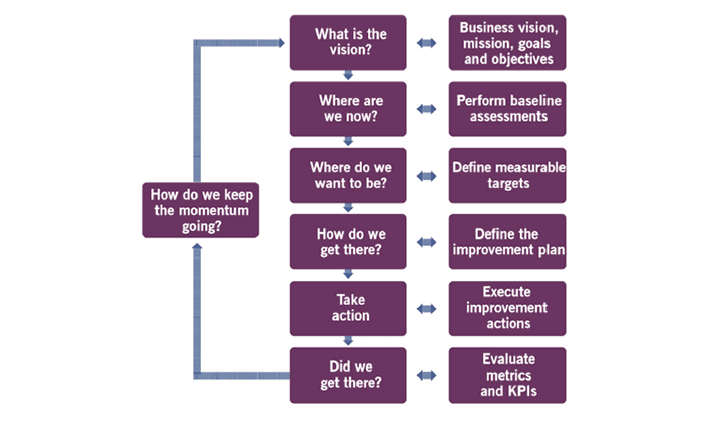ITIL® Guiding Principles for Continual Improvement
ITIL outlines seven guiding principles that can be used to guide your organisation in all circumstances, regardless of changes in its goals, strategies, type of work, or management structure.
The ITIL service management framework outlines seven essential guiding principles that play a pivotal role in steering your organisation through various circumstances. These principles remain steadfast, adapting to changes in goals, strategies, work types, or management structures. Let's delve into these key ITIL guiding principles:
7 ITIL Guiding Principles:
Focus on value
Align your efforts with delivering value, a cornerstone in ITIL service management, ensuring that every action contributes to overall business objectives.
Start where you are
Embrace your current state in the ITIL service lifecycle, acknowledging existing processes and building upon them for continual service improvement.
Progress iteratively with feedback
Follow an iterative approach within the ITIL framework, incorporating feedback loops to refine and enhance services continually.
Collaborate and promote visibility
Foster collaboration, a core tenet in ITIL service management, and enhance visibility to streamline operations and communication.
Think and work holistically
Embrace a holistic approach within the ITIL service lifecycle, considering the interconnectedness of processes for comprehensive and effective solutions.
Keep it simple and practical
In the intricate landscape of ITIL service management, simplicity and practicality are key. Streamline processes to ensure efficiency and effectiveness.
Optimise and automate
Leverage the power of optimisation and automation, inherent in the ITIL service lifecycle, to enhance operational efficiency and reduce manual effort during service transition.
Download the Guiding Principles to gain deeper insights into how these principles can elevate your organisation's approach to ITIL service management processes.
THE CONTINUAL IMPROVEMENT MODEL
ITIL Foundation highlights which guiding principles are most relevant for each step of the continual improvement model. However, all principles can be helpful to some extent at every step of an improvement initiative. The following table explains how the ITIL guiding principles can be applied to each improvement step.
Embrace the guidance of ITIL in your journey of continual service improvement and witness the transformative impact it can have on your organisation's ITIL service management.
Download the Guiding Principles
A Deeper Dive into ITIL Principles
As we get into an extended exploration of ITIL guiding principles for continual improvement, it's essential to unravel additional layers of insights to enrich your understanding and application of these principles. There are various aspects that amplify the value proposition of ITIL in diverse organisational scenarios.
The ITIL Service Management Framework
The ITIL service management framework stands as a dynamic and versatile tool that provides a structured approach to service delivery and continual improvement. Going beyond the seven guiding principles highlighted earlier, let's explore how the ITIL framework extends its reach to address specific challenges and opportunities within service management.
Improving Operations With Service Continuity Management
ITIL recognises the significance of uninterrupted service delivery and incorporates principles that align with service continuity management. This involves proactive planning and preparation to ensure that essential services remain available and customer satisfaction intact, even in the face of unforeseen disruptions.
The guiding principles of "Progress iteratively with feedback" and "Optimise and automate" play pivotal roles here. By continually iterating and refining continuity plans based on feedback and leveraging automation for rapid responses, organisations can enhance their resilience to disruptions.
A Symbiotic Relationship Between ITIL Framework and the Service Lifecycle
The ITIL service lifecycle is a comprehensive journey that encompasses various stages, from service strategy to continual service improvement. Each stage is interconnected, emphasising the need for a holistic perspective, as advocated by the principle of "Think and work holistically."
Additionally, the guiding principle of "Start where you are" encourages organisations to assess their existing position in the service lifecycle, acknowledging current processes, strengths, and weaknesses. This introspection becomes a foundation for targeted improvements, aligning with the continual improvement model.
ITIL in Practice
While the guiding principles offer a theoretical foundation, their real value emerges when organisations put them into practice. Let's explore practical scenarios where these principles become instrumental in addressing common challenges in IT service management and ITIL practices.
Collaboration in a Real-World Scenario
Consider a scenario where different IT teams operate in silos, leading to inefficiencies, communication gaps, and missed opportunities for collaboration. Embracing the guiding principle of "Collaborate and promote visibility" becomes a catalyst for positive change.
By fostering a culture of collaboration and enhancing visibility into ongoing operations, teams can break down silos, share insights, and collectively contribute to the overarching goals of the organisation. This collaborative spirit becomes a driving force for continual improvement.
Simplicity in Complexity: Enhancing Processes
In the intricate landscape of ITIL service management, complexity can hinder efficiency. The principle of "Keep it simple and practical" serves as a beacon, guiding organisations to streamline processes including financial management and service catalog management without compromising effectiveness.
Practical simplification involves identifying redundant steps, eliminating unnecessary complexities, and focusing on the core elements that contribute to value delivery. This simplification not only enhances operational efficiency but also aligns with the broader goal of delivering value to the business.
Nurturing a Culture of Improvement
Beyond frameworks and principles, the success of continual improvement initiatives in ITIL service management hinges on the people within the organisation. It's about fostering a culture that embraces change, values collaboration, and sees challenges as opportunities for growth.
Empowering Teams Through Training and ITIL Certification
A workforce equipped with the right skills is a formidable asset in the journey of continual improvement. Organisations can leverage training and certification programs aligned with the ITIL framework to empower their teams with the knowledge and competencies needed to implement guiding principles such as service portfolio management effectively.
Initiatives like the ITIL Foundation serve as cornerstones, providing a solid understanding of ITIL concepts and principles like incident management. This foundational knowledge becomes a catalyst for teams to contribute actively to the organisation's continual improvement endeavors in the IT service lifecycle.
Feedback Loops: A Vital Component of Improvement
The principle of "Progress iteratively with feedback" underscores the importance of continuous feedback loops. Implementing mechanisms for gathering feedback from stakeholders, end-users, and internal teams becomes crucial in identifying areas for improvement.
Establishing a culture that encourages open communication and values feedback fosters an environment where improvement is a shared responsibility. Regular retrospectives, post-implementation reviews, and feedback sessions become integral components of this feedback-driven culture.
Looking Ahead: The Future of ITIL and Service Management
As technology continues to advance and business dynamics shift, the relevance of ITIL in shaping effective service management practices becomes more pronounced. The principles outlined in the ITIL framework provide a timeless foundation, adaptable to the changing dynamics of the IT environment.
The Role of ITIL in Tech Advancements
With the advent of emerging technologies such as artificial intelligence, machine learning, and automation, the role of ITIL becomes even more critical. The principle of "Optimise and automate" aligns seamlessly with the evolving technological landscape, encouraging organisations to leverage automation for enhanced efficiency and operational excellence.
Embracing these technological advancements within the framework of ITIL offers organisations an opportunity to stay at the forefront of innovation. Automation, when applied judiciously, not only streamlines processes but also frees up human resources to focus on strategic initiatives and value-adding activities.
Strategic Alignment and Business Value
The principles of "Focus on value" and "Think and work holistically" underscore the importance of aligning IT services with overall business objectives. As organisations navigate the complexities of the modern business landscape, ITIL provides a structured approach to ensure that IT services contribute meaningfully to the achievement of business goals.
By adopting a holistic perspective, organisations can optimise their IT services to deliver maximum value. This involves not only understanding the technical intricacies of ITIL but also aligning these intricacies with the broader strategic goals of the business.
Harvesting the Fruits of Continual Improvement
The principles outlined in the ITIL framework serve as an invaluable guide for organisations seeking to enhance their service management practices. The journey of continual improvement, as facilitated by ITIL, is a dynamic and ongoing process. Organisations that embrace these guiding principles and put them into practice stand to reap the fruits of enhanced operational efficiency and a heightened ability to the demanding nature of the digital space.
As you navigate your organisation's path of continual improvement, remember that ITIL is not a one-size-fits-all solution but rather a flexible framework that can be tailored to suit the unique needs and goals of your organisation. By embracing these principles and weaving them into the fabric of your organisational culture, you pave the way for sustained success in the transformative space of IT service management.





